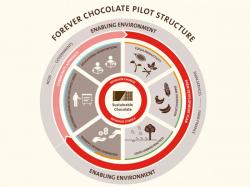Barry Callebaut Launches Its First Pilot To Drive Systemic Change In Cocoa Farming
February 28, 2018 | 2 min to read

Barry Callebaut launched its first Forever Chocolate Pilot in Indonesia. This is the first of a series of five pilot programs planned in cocoa origin countries that are intended to test theories of change in our quest to accelerate impact in sustainable cocoa production. We aim to increase the income of farmers, eradicate child labor and become carbon positive. Oliver Von Hagen, who is responsible for the Forever Chocolate pilots, provides further details.
Let’s start by telling us why we need the pilots?
Oliver Von Hagen (OVH): The problems in the cocoa supply chain have been clearly identified, but the solutions to these problems, we recognize, are not so evident. But, what we know is this: low productivity on cocoa farms from poor agricultural practices, nutrient depleted soil and aging cocoa trees means that many farmers exist in a state of poverty. This means farmers are unable to invest in their farms, and therefore continue to have low productivity and income. The consequence is that family members, who may include children, may end up working in the fields. To add to this complexity, deforestation and climate change mean that the land suitable for growing cocoa will be significantly reduced in West Africa. If the industry does not reduce its carbon footprint and achieve zero net deforestation in its supply chain, the ecosystem will continue to suffer. So, to answer your question on why we need the pilots, we want to accelerate impact, we want to test innovative approaches, we want to learn if these approaches are effective to reach our Forever Chocolate targets, and critically, we want to evaluate if these approaches are scalable, replicable and self-sustaining models. We are partnering with Wageningen University & Research who is providing us with robust, scientific support to provide the baseline and analytical framework against which we can assess the outcomes.
To read the rest of the story, please go to: Barry Callebaut Group
